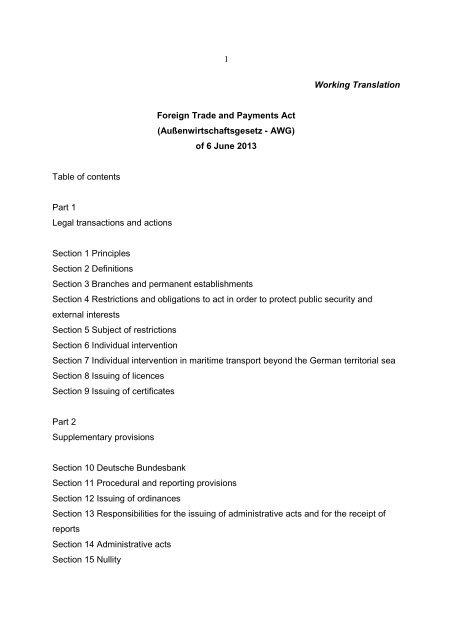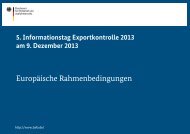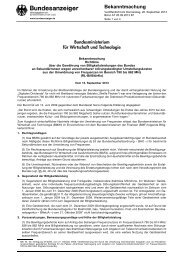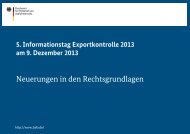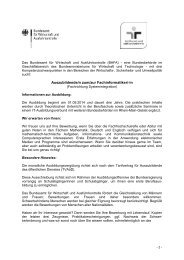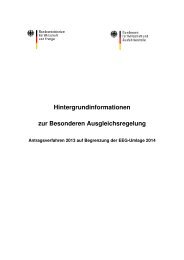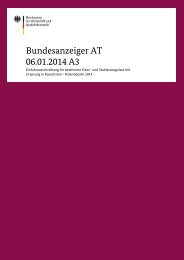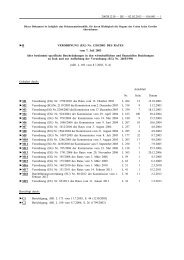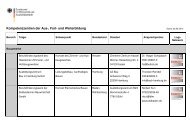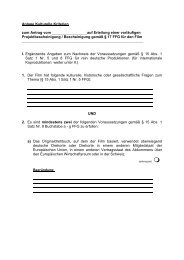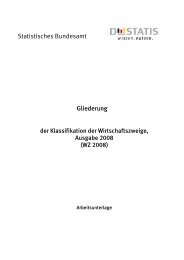1 Working Translation Foreign Trade and Payments Act ... - Bafa
1 Working Translation Foreign Trade and Payments Act ... - Bafa
1 Working Translation Foreign Trade and Payments Act ... - Bafa
Create successful ePaper yourself
Turn your PDF publications into a flip-book with our unique Google optimized e-Paper software.
1<br />
<strong>Working</strong> <strong>Translation</strong><br />
<strong>Foreign</strong> <strong>Trade</strong> <strong>and</strong> <strong>Payments</strong> <strong>Act</strong><br />
(Außenwirtschaftsgesetz - AWG)<br />
of 6 June 2013<br />
Table of contents<br />
Part 1<br />
Legal transactions <strong>and</strong> actions<br />
Section 1 Principles<br />
Section 2 Definitions<br />
Section 3 Branches <strong>and</strong> permanent establishments<br />
Section 4 Restrictions <strong>and</strong> obligations to act in order to protect public security <strong>and</strong><br />
external interests<br />
Section 5 Subject of restrictions<br />
Section 6 Individual intervention<br />
Section 7 Individual intervention in maritime transport beyond the German territorial sea<br />
Section 8 Issuing of licences<br />
Section 9 Issuing of certificates<br />
Part 2<br />
Supplementary provisions<br />
Section 10 Deutsche Bundesbank<br />
Section 11 Procedural <strong>and</strong> reporting provisions<br />
Section 12 Issuing of ordinances<br />
Section 13 Responsibilities for the issuing of administrative acts <strong>and</strong> for the receipt of<br />
reports<br />
Section 14 Administrative acts<br />
Section 15 Nullity
2<br />
Section 16 Judgement <strong>and</strong> compulsory enforcement<br />
Part 3<br />
Provisions on penalties, fines <strong>and</strong> surveillance<br />
Section 17 Provisions on penalties<br />
Section 18 Provisions on penalties<br />
Section 19 Provisions on fines<br />
Section 20 Confiscation <strong>and</strong> extended forfeiture<br />
Section 21 Tasks <strong>and</strong> powers of the customs authorities<br />
Section 22 Criminal <strong>and</strong> fine proceedings<br />
Section 23 General duty to provide information<br />
Section 24 Transmission of information by the Federal Office of Economics <strong>and</strong> Export<br />
Control (BAFA)<br />
Section 25 Automated retrieval procedure<br />
Section 26 Transmission of personal data from criminal proceedings<br />
Section 27 Surveillance of freight, postal <strong>and</strong> passenger traffic<br />
Section 28 Costs
3<br />
Part 1<br />
Legal transactions <strong>and</strong> actions<br />
Section 1<br />
Principles<br />
(1) The trade in goods, services, capital, payments <strong>and</strong> other types of trade with foreign<br />
territories, as well as the trade in foreign valuables <strong>and</strong> gold between residents (foreign<br />
trade <strong>and</strong> payments) is, in principle, not restricted. It is subject to the restrictions<br />
contained in this <strong>Act</strong> or prescribed by ordinances issued on the basis of this <strong>Act</strong>.<br />
(2) This shall be without prejudice to<br />
1. provisions in other acts <strong>and</strong> ordinances,<br />
2. international agreements which the legislative bodies have approved in the form<br />
of a Federal act, <strong>and</strong><br />
3. legal provisions of the bodies of international organisations to which the Federal<br />
Republic of Germany has transferred sovereign rights.<br />
Section 2<br />
Definitions<br />
(1) The definitions contained in subsections 2 to 25 shall apply to this <strong>Act</strong> <strong>and</strong> the<br />
ordinances issued on the basis of this <strong>Act</strong>, unless this <strong>Act</strong> or such an ordinance<br />
stipulates otherwise.<br />
(2) An exporter shall mean any natural or legal person or partnership which holds the<br />
contract with the consignee in a third country at the time of the export <strong>and</strong>
4<br />
1. has the power to determine the delivery of material goods from Germany to a<br />
third country or<br />
2. in the case of software or technology has the power to determine its transmission<br />
from Germany to a third country, including its making available by electronic<br />
means to a third country.<br />
If pursuant to the export contract a foreigner holds the right to dispose of the goods, the<br />
domestic contracting party shall be deemed to be the exporter. If no export contract was<br />
concluded, or if the contracting party is not acting on its own behalf, the exporter shall be<br />
deemed to be the party which actually has the power to determine the export.<br />
(3) An export shall mean<br />
1. the delivery of material goods from Germany to a third country <strong>and</strong><br />
2. the transmission of software <strong>and</strong> technology from Germany to a third country<br />
including its making available by electronic means to natural <strong>and</strong> legal persons in<br />
third countries.<br />
(4) Export consignment shall embrace the material goods which an exporter exports<br />
simultaneously via the same customs office at the point of exit to the same country of<br />
destination.<br />
(5) <strong>Foreign</strong>ers shall mean all persons <strong>and</strong> partnerships which are not residents.<br />
(6) <strong>Foreign</strong> assets shall mean<br />
1. assets abroad,<br />
2. claims in euro against foreigners <strong>and</strong><br />
3. instruments of payment denominated in currencies other than the euro, claims<br />
<strong>and</strong> securities.
5<br />
(7) Country of destination shall mean the country in which the goods are to be used or<br />
consumed, treated or processed, or if this country is not known, the last known country<br />
into which the goods are to be exported.<br />
(8) Third countries shall mean the territories outside the customs territory of the<br />
European Union with the exception of Helgol<strong>and</strong>.<br />
(9) Transit shall mean<br />
1. the transportation of material goods from abroad through Germany without the<br />
goods having been released for free circulation in Germany, <strong>and</strong><br />
2. the transportation of material goods in free circulation from another Member<br />
State of the European Union through Germany.<br />
(10) Importer shall mean any natural or legal person or partnership which<br />
1. delivers material goods from third countries to Germany, or has them delivered,<br />
<strong>and</strong> has the power to determine the delivery of the material goods or<br />
2. in the case of software or technology has the power to determine its transmission<br />
from third countries to Germany, including its making available by electronic<br />
means to Germany.<br />
If the import is based on a contract with a non-EU party on the acquisition of goods for<br />
the purposes of import, only the domestic contracting party shall be the importer.<br />
(11) Import shall mean<br />
1. the delivery of material goods from third countries to Germany <strong>and</strong><br />
2. the transmission of software <strong>and</strong> technology including its making available by<br />
electronic means to natural <strong>and</strong> legal persons in Germany.
6<br />
If material goods are delivered from third countries to a free zone or in a suspensive<br />
procedure, import shall take place only once the material goods<br />
1. have been used, consumed, treated or processed in the free zone or<br />
2. transferred to free circulation.<br />
(12) Country of purchase shall mean the country in which the non-EU party from which<br />
the EU resident acquires the goods is resident. This country shall continue to be<br />
deemed the country of purchase if the goods are sold on to another EU resident. If there<br />
is no legal transaction governing the acquisition of goods between an EU resident <strong>and</strong> a<br />
non-EU party, the country of purchase shall be deemed to be the country in which the<br />
person entitled to dispose of the goods is resident who imports the goods into the<br />
customs territory of the European Union. If the person entitled to dispose of the goods<br />
who imports the goods into the customs territory of the European Union is resident in the<br />
customs territory of the European Union, the country of origin shall be deemed to be the<br />
country of purchase.<br />
(13) Goods shall mean material goods, software <strong>and</strong> technology. Technology shall also<br />
include documents for the manufacture of material goods or of parts of these material<br />
goods.<br />
(14) A trafficking <strong>and</strong> brokering transaction shall mean<br />
1. the brokering of a contract on the acquisition or release of goods,<br />
2. the documentation of an opportunity to conclude such a contract or<br />
3. the conclusion of a contract on the release of goods.<br />
A trafficking <strong>and</strong> brokering transaction shall not be the sole provision of auxiliary<br />
services. Auxiliary services are transportation, financial services, insurance or<br />
reinsurance or general advertising or sales promotion.
7<br />
(15) Residents shall mean<br />
1. natural persons resident or habitually resident in Germany,<br />
2. legal persons <strong>and</strong> partnerships based or headquartered in Germany,<br />
3. branches of foreign legal persons or partnerships if the headquarters of the<br />
branch are in Germany <strong>and</strong> separate accounts are kept for them, <strong>and</strong><br />
4. permanent establishments of foreign legal persons or partnerships in Germany if<br />
the permanent establishments are administered in Germany.<br />
(16) Technical support shall mean all technical assistance related to the repair, the<br />
development, the manufacture, the assembly, the testing, the maintenance or any other<br />
technical service. Technical support can take the form of instruction, training, passing on<br />
of practical knowledge or skills or the form of advisory services. It also includes support<br />
provided orally, by telephone, <strong>and</strong> by electronic means.<br />
(17) Transit trade shall mean any transaction in which residents acquire from foreigners<br />
<strong>and</strong> sell to foreigners material goods located abroad or delivered to Germany but not<br />
cleared for importation. Legal transactions in which these material goods are sold to<br />
other residents with a view to sale to foreigners shall be equivalent to transit trade.<br />
(18) EU residents shall mean<br />
1. natural persons resident or habitually resident in the European Union,<br />
2. legal persons or partnerships based or headquartered in the European Union,<br />
3. branches of legal persons based or headquartered in a third country if the<br />
headquarters of the branch are in the European Union <strong>and</strong> separate accounts are<br />
kept for them, <strong>and</strong><br />
4. permanent establishments of legal persons from third countries if the permanent<br />
establishments are administered in the European Union.<br />
(19) Non-EU residents are all persons <strong>and</strong> partnerships which are not EU residents.
8<br />
(20) Transferer shall mean any natural or legal person or partnership which has the<br />
power to determine the transfer of goods <strong>and</strong> at the time of transfer<br />
1. in the case of subsection 21 no. 1 holds the contract with the consignee in the<br />
customs territory of the European Union or<br />
2. in the case of subsection 21 no. 2 holds the contract with the consignee in<br />
Germany.<br />
If pursuant to the transfer contract a foreigner holds the right to dispose of the goods, the<br />
domestic contracting party shall be deemed to be the transferer. If no transfer contract<br />
was concluded, or if the contracting party is not acting on its own behalf, the transferer<br />
shall be deemed to be the party which actually has the power to determine the transfer.<br />
(21) Transfer shall mean<br />
1. the delivery of material goods or the transmission of software or technology from<br />
Germany to the remaining customs territory of the European Union including its<br />
provision by electronic means to natural <strong>and</strong> legal persons in the remaining<br />
customs territory of the European Union <strong>and</strong><br />
2. the delivery of material goods or the transmission of software or technology from<br />
the remaining customs territory of the European Union to Germany including its<br />
provision by electronic means to natural <strong>and</strong> legal persons in Germany.<br />
(22) Material goods shall mean movable objects which can be the subject of trade<br />
relations, <strong>and</strong> electricity. Securities <strong>and</strong> means of payment shall not be material goods.<br />
(23) The value of a good shall mean the fee invoiced to the consignee or, in the<br />
absence of a consignee or a determinable fee, the statistical value within the meaning of<br />
the provisions on the statistics of cross-border trade in goods. If a legal transaction or an<br />
action forms part of a single overall economic process, the value of the overall process<br />
shall be used in the application of the value thresholds of this <strong>Act</strong> or an ordinance based<br />
on this <strong>Act</strong>.
9<br />
(24) Securities shall mean<br />
1. securities within the meaning of Section 1 subsection 1 of the Securities Deposit<br />
<strong>Act</strong>,<br />
2. shares in a securities depository or a collective debt register claim,<br />
3. rights to deliver or assign securities within the meaning of nos. 1 <strong>and</strong> 2.<br />
Domestic securities shall mean securities which a resident or, prior to 9 May 1945, a<br />
person resident or legally established in the territory of the German Reich as of 31<br />
December 1937 has issued. <strong>Foreign</strong> securities shall mean securities which a foreigner<br />
has issued to the extent that they are not domestic securities.<br />
(25) The customs territory of the European Union shall mean the customs territory of<br />
the European Community pursuant to Article 3 of Council Regulation (EEC) No. 2913/92<br />
establishing the Community Customs Code (OJ L 302 of 19 October 1992, p. 1) in the<br />
version applicable at the time.<br />
Section 3<br />
Branches <strong>and</strong> permanent establishments<br />
(1) Domestic branches <strong>and</strong> permanent establishments of foreigners <strong>and</strong> foreign<br />
branches <strong>and</strong> permanent establishments of residents shall be regarded as legally<br />
independent. Several domestic branches <strong>and</strong> permanent establishments of the same<br />
foreigners shall be regarded as one domestic branch or permanent establishment.<br />
(2) <strong>Act</strong>ions taken by or towards branches or permanent establishments within the<br />
meaning of subsection 1 shall be regarded as legal transactions to the extent that such<br />
actions would be legal transactions in relations between natural or legal persons or<br />
partnerships.
10<br />
(3) An ordinance issued on the basis of this <strong>Act</strong> or an enforceable order pursuant to<br />
Section 6 can provide that<br />
1. several foreign branches <strong>and</strong> permanent establishments of the same resident<br />
shall be regarded as one foreigner in derogation from subsection 1 sentence 1,<br />
2. domestic branches <strong>and</strong> permanent establishments of the same foreigner shall<br />
each be regarded as residents in derogation from subsection 1 sentence 2,<br />
3. branches <strong>and</strong> permanent establishments shall not be regarded as foreigners or<br />
residents in derogation from Section 2 subsection 5 <strong>and</strong> 15 or<br />
4. branches <strong>and</strong> permanent establishments shall not be regarded as EU residents<br />
or non-EU residents in derogation from Section 2 subsection 18 <strong>and</strong> 19.<br />
Section 4<br />
Restrictions <strong>and</strong> obligations to act in order to protect public security <strong>and</strong> external<br />
interests<br />
(1) In foreign trade <strong>and</strong> payments transactions, legal transactions <strong>and</strong> actions can be<br />
restricted <strong>and</strong> obligations to act can be imposed by ordinance, in order<br />
1. to guarantee the essential security interests of the Federal Republic of Germany,<br />
2. to prevent a disturbance of the peaceful coexistence of nations or<br />
3. to prevent a substantial disturbance to the foreign relations of the Federal<br />
Republic of Germany,<br />
4. to guarantee the public order or security of the Federal Republic of Germany<br />
within the meaning of Articles 36, 52(1) <strong>and</strong> Article 65(1) of the Treaty on the<br />
Functioning of the European Union or<br />
5. to counteract a danger to the coverage of vital needs in Germany or in parts of<br />
Germany <strong>and</strong> thereby to protect the health <strong>and</strong> life of human beings in<br />
accordance with Article 36 of the Treaty on the Functioning of the European<br />
Union.
11<br />
(2) In foreign trade <strong>and</strong> payments transactions, legal transactions <strong>and</strong> actions can be<br />
restricted <strong>and</strong> obligations to act can also be imposed by ordinance, in order<br />
1. to implement decisions of the Council of the European Union on economic<br />
sanctions in the field of Common <strong>Foreign</strong> <strong>and</strong> Security Policy,<br />
2. to implement obligations of the Member States of the European Union which are<br />
provided for in directly applicable legal acts of the European Union to implement<br />
economic sanctions in the field of Common <strong>Foreign</strong> <strong>and</strong> Security Policy,<br />
3. to implement UN Security Council resolutions or<br />
4. to implement international agreements which the legislative bodies have<br />
approved in the form of a Federal act.<br />
(3) The ordering of licensing requirements or of prohibitions shall be regarded as a<br />
restriction pursuant to subsections 1 <strong>and</strong> 2.<br />
(4) Restrictions <strong>and</strong> obligations to act shall be limited in nature <strong>and</strong> scope to the extent<br />
necessary to achieve the objective stated in the authorisation. They shall be framed in a<br />
manner which intervenes as little as possible in the freedom of economic activity.<br />
Restrictions <strong>and</strong> obligations to act may affect existing contracts only if the objective<br />
stated in the authorisation is in serious jeopardy. They shall be revoked as soon as <strong>and</strong><br />
insofar as the reasons warranting their imposition no longer apply.<br />
Section 5<br />
Subject of restrictions<br />
(1) Restrictions or obligations to act pursuant to Section 4 subsection 1 can particularly<br />
be imposed on legal transactions or actions with reference to<br />
1. weapons, ammunition <strong>and</strong> other military equipment <strong>and</strong> goods for the<br />
development, manufacture or deployment of weapons, ammunition <strong>and</strong> other
12<br />
military equipment; this shall particularly be the case if the restriction serves to<br />
implement export controls agreed in international co-operation,<br />
2. goods which are destined for the conduct of military actions.<br />
(2) Restrictions or obligations to act pursuant to Section 4 subsection 1 no. 4 can<br />
particularly be imposed with reference to the acquisition of domestic companies or<br />
shares in such companies by non-EU residents if the acquisition endangers the public<br />
order or security of the Federal Republic of Germany pursuant to Section 4 subsection 1<br />
no. 4. For this to be the case, there must be an actual <strong>and</strong> sufficiently serious danger<br />
affecting a fundamental interest of society. Non-EU acquirers from member states of the<br />
European Free <strong>Trade</strong> Association shall be equivalent to acquirers resident in the EU.<br />
(3) Restrictions or obligations to act pursuant to Section 4 subsection 1 no. 1 can<br />
particularly be imposed with reference to the acquisition of domestic companies or<br />
shares in such companies by foreigners in order to guarantee essential security interests<br />
of the Federal Republic of Germany if the domestic companies<br />
1. manufacture or develop war weapons or other military equipment or<br />
2. manufacture products with IT security functions to process classified state<br />
material or components essential to the IT security function of such products or<br />
have manufactured such products <strong>and</strong> still dispose of the technology if the overall<br />
product was licensed with the knowledge of the company by the Federal IT<br />
Security Agency.<br />
This applies in particular if the security policy interests of the Federal Republic of<br />
Germany or the military security provisions are endangered as a consequence of the<br />
acquisition.<br />
(4) Restrictions or obligations to act pursuant to Section 4 subsection 1 no. 5 can also be<br />
imposed with regard to goods not cited in subsection 1. For this to be the case, there<br />
must be an actual <strong>and</strong> sufficiently serious danger affecting a fundamental interest of<br />
society.
13<br />
(5) Restrictions or obligations to act pursuant to Section 4 subsection 1 can also be<br />
imposed with regard to legal transactions or actions of Germans abroad which refer to<br />
goods within the meaning of subsection 1 including their development <strong>and</strong> manufacture.<br />
Section 6<br />
Individual intervention<br />
(1) In foreign trade <strong>and</strong> payments transactions, legal transactions <strong>and</strong> actions can also<br />
be restricted or obligations to act can be imposed by administrative act in order to avert<br />
a danger pertaining in an individual case to the interests cited in Section 4 subsection 1.<br />
(2) The order shall expire six months after its enactment unless the restriction or<br />
obligation to act is imposed by an ordinance.<br />
(3) Section 4 subsections 3 <strong>and</strong> 4 <strong>and</strong> Section 5 subsection 5 shall apply mutatis<br />
mut<strong>and</strong>is.<br />
Section 7<br />
Individual intervention in maritime transport beyond the German territorial sea<br />
(1) In order to avert a danger existing in an individual case to the interests cited in<br />
Section 4 subsection 1 which is caused by the transportation of goods on board a<br />
maritime vessel bearing the Federal flag on the maritime side of the border of the<br />
German territorial sea, pursuant to Section 6 subsection 1 in particular necessary<br />
measures can be imposed to steer, accelerate <strong>and</strong> restrict the transportation of the<br />
goods <strong>and</strong> the h<strong>and</strong>ling <strong>and</strong> unloading of the goods.<br />
(2) The measures pursuant to subsection 1 can be directed against the owner, the<br />
equipment supplier, the charterer, the master or the other possessor of actual control.
14<br />
(3) The owner, the equipment supplier, the charterer, the master or any other possessor<br />
of actual control shall be obliged on dem<strong>and</strong> to provide without delay details of<br />
1. the nature <strong>and</strong> size of the load,<br />
2. the route travelled since the last port <strong>and</strong> the intended route,<br />
3. the expected duration of the passage <strong>and</strong><br />
4. the port of destination.<br />
(4) The owner of a vessel operated in maritime shipping under a foreign flag which is<br />
entered into a German register of ships shall ensure that on dem<strong>and</strong> the necessary<br />
details are transmitted without delay <strong>and</strong> to the same extent as is provided pursuant to<br />
subsection 3 for vessels under the Federal flag in order to avert a danger to the interests<br />
cited in Section 4 subsection 1.<br />
(5) Section 4 subsections 3 <strong>and</strong> 4, Section 5 subsection 5 <strong>and</strong> Section 6 subsection 2<br />
shall apply mutatis mut<strong>and</strong>is.<br />
Section 8<br />
Issuing of licences<br />
(1) If legal transactions or actions require a licence pursuant to a provision of this <strong>Act</strong> or<br />
an ordinance issued on the basis of this <strong>Act</strong>, the licence must be issued if it is to be<br />
expected that the undertaking of the legal transaction or action will not endanger the<br />
purpose of the provision or will do so only to a minor degree. In other cases, the licence<br />
can be issued if the national economic interest in the undertaking of the legal transaction<br />
or action will outweigh the related damage to the purpose cited in the authorisation.<br />
(2) The issuing of the licence can be made dependent on material <strong>and</strong> personal<br />
requirements, <strong>and</strong> particularly the reliability of the applicant. The same shall apply to the<br />
issuing of certificates by the Federal Office of Economics <strong>and</strong> Export Control (BAFA)<br />
stating that an export does not require a licence.
15<br />
(3) If the issuing of licences is possible only to a restricted degree in terms of the<br />
purpose served by the provision, the licences shall be issued in a manner enabling the<br />
given possibilities to be exploited in an appropriate economic manner.<br />
(4) EU residents which are particularly affected by a restriction pursuant to subsection 3<br />
in the exercise of their trade can be given preferential consideration.<br />
(5) When applying for a licence pursuant to subsection 1 sentence 1 or a certificate<br />
pursuant to subsection 2 sentence 2, the applicant must provide or use full <strong>and</strong> correct<br />
data.<br />
Section 9<br />
Issuing of certificates<br />
An ordinance issued on the basis of this <strong>Act</strong> can provide for the issuing of certificates to<br />
the extent necessary for certification pursuant to Article 9 of Directive 2009/43/EC of the<br />
European Parliament <strong>and</strong> of the Council of 6 May 2009 simplifying terms <strong>and</strong> conditions<br />
of transfers of defence-related products within the Community (OJ L 146 of 10 June<br />
2009, p. 1). Section 8 subsection 5 shall apply mutatis mut<strong>and</strong>is.
16<br />
Part 2<br />
Supplementary provisions<br />
Section 10<br />
Deutsche Bundesbank<br />
Restrictions pursuant to a provision of this <strong>Act</strong> or an ordinance or enforceable order<br />
issued on the basis of this <strong>Act</strong> shall not apply to legal transactions <strong>and</strong> actions which the<br />
Deutsche Bundesbank undertakes in its sphere of business or which are undertaken<br />
towards it.<br />
Section 11<br />
Procedural <strong>and</strong> reporting provisions<br />
(1) Procedural provisions can be enacted by ordinance<br />
1. to implement this <strong>Act</strong> <strong>and</strong> ordinances issued on the basis of this <strong>Act</strong>,<br />
2. to examine the lawfulness of legal transactions or actions in foreign trade <strong>and</strong><br />
payments transactions <strong>and</strong><br />
3. to implement<br />
a) the provisions of the European treaties, including the related<br />
protocols,<br />
b) the agreements of the European Union <strong>and</strong><br />
c) the legal acts of the European Union based on the treaties <strong>and</strong><br />
agreements cited in letters a <strong>and</strong> b.<br />
(2) It is possible to issue an ordinance requiring that legal transactions <strong>and</strong> actions in<br />
foreign trade <strong>and</strong> payments transactions, <strong>and</strong> particularly claims <strong>and</strong> obligations arising<br />
therefrom <strong>and</strong> assets <strong>and</strong> the making <strong>and</strong> receiving of payments are reported, citing the<br />
legal basis for this, so that
17<br />
1. it can be ascertained whether the preconditions for the lifting, relaxation or<br />
imposition of restrictions pertain,<br />
2. the balance of payments of the Federal Republic of Germany can be drawn up at<br />
any time,<br />
3. the safeguarding of the interests of external economic policy is ensured or<br />
4. obligations under international agreements or international export control regimes<br />
can be fulfilled.<br />
(3) In order to safeguard the purposes of subsection 2 nos. 1 to 4, it is possible to issue<br />
an ordinance requiring that the status <strong>and</strong> selected items of the composition of assets of<br />
residents abroad <strong>and</strong> of foreigners in Germany are reported. If the assets to be reported<br />
include a direct or indirect stake in a company, it can be required that the status <strong>and</strong><br />
selected items of the composition of the assets of the company in which the stake is<br />
held are reported.<br />
(4) It is also possible to issue an ordinance requiring obligations to document <strong>and</strong><br />
preserve data in order to enable examination pursuant to subsection 1 no. 2 or to fulfil<br />
reporting requirements pursuant to subsections 2 <strong>and</strong> 3.<br />
(5) Sections 9, 15 <strong>and</strong> 16 of the Federal Statistics <strong>Act</strong> shall be applied mutatis mut<strong>and</strong>is<br />
in the cases of subsections 2 <strong>and</strong> 3.<br />
Section 12<br />
Issuing of ordinances<br />
(1) Ordinances pursuant to this <strong>Act</strong> shall be issued by the Federal Government. In<br />
derogation of sentence 1, ordinances pursuant to Section 4 subsection 2 shall be issued<br />
by the Federal Ministry of Economics <strong>and</strong> Technology in agreement with the Federal<br />
<strong>Foreign</strong> Office <strong>and</strong> the Federal Ministry of Finance.<br />
(2) The ordinances shall not require the approval of the Bundesrat.
18<br />
(3) In the case of provisions affecting capital <strong>and</strong> payment transactions or trade in<br />
foreign valuables <strong>and</strong> gold, consultation shall be made with the Deutsche Bundesbank.<br />
(4) The Bundestag <strong>and</strong> Bundesrat shall be informed of ordinances immediately following<br />
their promulgation. The Bundesrat can make comments to the Bundestag within four<br />
weeks. The ordinances must be revoked without delay to the extent that the Bundestag<br />
requires this within four months of their promulgation.<br />
(5) Subsection 4 shall not be applied to ordinances whereby the Federal Government or<br />
the Federal Ministry of Economics <strong>and</strong> Technology has imposed or revoked restrictions<br />
on movements of goods, capital or payments with other countries pursuant to Section 4<br />
subsection 2.<br />
Section 13<br />
Responsibilities for the issuing of administrative acts <strong>and</strong> for the receipt of<br />
reports<br />
(1) The Federal Office of Economics <strong>and</strong> Export Control (BAFA) shall be responsible for<br />
the issuing of administrative acts <strong>and</strong> the receipt of reports on the basis of this <strong>Act</strong> <strong>and</strong><br />
of ordinances issued on the basis of this <strong>Act</strong> <strong>and</strong> of acts of the Council or the<br />
Commission of the European Union in the field of foreign trade <strong>and</strong> payments law to the<br />
extent that this <strong>Act</strong> or an ordinance issued on the basis of this <strong>Act</strong> does not provide<br />
otherwise.<br />
(2) The following authorities shall have exclusive responsibility:<br />
1. the Deutsche Bundesbank in the field of movements of capital <strong>and</strong> payments <strong>and</strong><br />
the movement of foreign assets <strong>and</strong> gold unless prescribed otherwise below,<br />
2. the Federal Ministry of Economics <strong>and</strong> Technology
19<br />
a) in the case of Section 6 subsection 1 in agreement with the Federal <strong>Foreign</strong><br />
Office <strong>and</strong> the Federal Ministry of Finance; in the case of measures which<br />
affect the fields of movements of capital <strong>and</strong> payments or the movement of<br />
foreign assets <strong>and</strong> gold, consultations must be held with the Deutsche<br />
Bundesbank,<br />
b) in the case of Section 7 in agreement with the Federal <strong>Foreign</strong> Office <strong>and</strong> the<br />
Federal Ministry of Transport, Building <strong>and</strong> Urban Development,<br />
c) in the case of Section 4 subsection 1 no. 4 in conjunction with Section 5<br />
subsection 2 <strong>and</strong> an ordinance issued on the basis of these provisions; a<br />
prohibition or the issuing of orders relating to an acquisition within the<br />
meaning of Section 5 subsection 2 shall require the approval of the Federal<br />
Government,<br />
d) in the case of Section 4 subsection 1 no. 1 in conjunction with Section 5<br />
subsection 3 <strong>and</strong> an ordinance issued on the basis of these provisions in<br />
agreement with the Federal <strong>Foreign</strong> Office <strong>and</strong> the Federal Ministry of<br />
Defence <strong>and</strong> in the case of Section 4 subsection 1 no. 1 in conjunction with<br />
Section 5 subsection 3 no. 2 <strong>and</strong> an ordinance issued on the basis of these<br />
provisions also in agreement with the Federal Ministry of the Interior,<br />
3. the Federal Ministry of Transport, Building <strong>and</strong> Urban Development for orders in<br />
the field of movements of services in the field of transport pursuant to Section 4<br />
subsections 1 <strong>and</strong> 2 in conjunction with an ordinance issued on the basis of this<br />
provision,<br />
4. the Federal Ministry of Finance for orders in the field of movements of services in<br />
the field of insurance pursuant to Section 4 subsections 1 <strong>and</strong> 2 in conjunction<br />
with an ordinance issued on the basis of this provision,<br />
5. the Federal Office for Agriculture <strong>and</strong> Food for orders in the field of movements<br />
of goods <strong>and</strong> services pursuant to Section 4 subsections 1 <strong>and</strong> 2 in conjunction<br />
with an ordinance issued on the basis of this provision in the context of the<br />
common organisation of the markets of the European Union in food <strong>and</strong><br />
agriculture products.
20<br />
(3) In the cases of subsection 2 nos. 3 <strong>and</strong> 4, the responsible Federal Ministry can<br />
transfer its responsibility for the tasks cited there to a higher federal authority or federal<br />
agency within its portfolio.<br />
Section 14<br />
Administrative acts<br />
(1) Administrative acts pursuant to this <strong>Act</strong> or to an ordinance issued on the basis of this<br />
<strong>Act</strong> can be furnished with ancillary provisions. The administrative acts shall not be<br />
transferable if they do not provide otherwise.<br />
(2) Objections <strong>and</strong> actions for annulment shall not have a suspensive effect.<br />
Section 15<br />
Nullity<br />
(1) A legal transaction that is entered into without the necessary licence shall be null <strong>and</strong><br />
void. It shall gain effect from the time of its undertaking if it is subsequently licensed or<br />
the requirement for a licence is subsequently removed. The retrospective effect shall be<br />
without prejudice to the rights of third parties which were derived from the subject of the<br />
legal transaction prior to the licensing.<br />
(2) If, for a legal transaction pertaining to the law of obligations on the acquisition of a<br />
domestic company or a direct or indirect stake in a domestic company, a right of<br />
examination exists on the basis of Section 4 subsection 1 no. 4 <strong>and</strong> Section 5<br />
subsection 2 in conjunction with an ordinance issued on the basis of these provisions<br />
<strong>and</strong> if this right of examination is coupled with an authorisation of the Federal Ministry of<br />
Economics <strong>and</strong> Technology to prohibit the acquisition with the consent of the Federal<br />
Government within a certain period, the entry into force of the legal effects of the legal<br />
transaction shall be subject to the dissolving condition until the conclusion of the entire
21<br />
examination procedure that the Federal Ministry of Economics <strong>and</strong> Technology prohibit<br />
the acquisition within the deadline.<br />
(3) A legal transaction which serves the realisation of the acquisition of a domestic<br />
company or a direct or indirect stake in a domestic company shall be provisionally<br />
invalid if a reporting requirement which is linked to an authorisation for the Federal<br />
Government to prohibit the acquisition within a certain deadline exists on the basis of<br />
Section 4 subsection 1 no. 1 <strong>and</strong> Section 5 subsection 3 in conjunction with an<br />
ordinance issued on the basis of these provisions. The legal transaction shall be<br />
effective from the time of its undertaking if the Federal Ministry of Economics <strong>and</strong><br />
Technology releases it in writing or does not prohibit the acquisition within the deadline<br />
pursuant to sentence 1. Subsection 1 sentence 3 shall apply mutatis mut<strong>and</strong>is.<br />
Section 16<br />
Judgement <strong>and</strong> compulsory enforcement<br />
(1) If a licence is required regarding a fulfilment of the debtor’s obligation, a judgement to<br />
issue the licence can only be made if the wording of the judgement includes a<br />
reservation that the fulfilment of the debtor’s obligation or compulsory execution may<br />
only take place once the licence has been issued. This shall apply correspondingly to<br />
other instruments permitting enforcement if the enforcement can only be realised on the<br />
basis of an enforceable copy of the instrument. Arrests <strong>and</strong> temporary injunctions which<br />
only serve to safeguard the underlying claim can be issued without reservation.<br />
(2) If a licence is required regarding a fulfilment of the debtor’s obligation, the<br />
compulsory enforcement shall only be permissible once <strong>and</strong> to the extent that the<br />
licence has been issued. To the extent that assets may only be acquired or sold with a<br />
licence, this shall also apply to the acquisition <strong>and</strong> sale by way of compulsory<br />
enforcement.
22<br />
Part 3<br />
Provisions on penalties, fines <strong>and</strong> surveillance<br />
Section 17<br />
Provisions on penalties<br />
(1) A prison sentence of between one <strong>and</strong> ten years shall be imposed on anyone who<br />
violates an ordinance issued pursuant to Section 4 subsection 1 which serves to<br />
implement an economic sanction adopted<br />
1. by the Security Council of the United Nations under Chapter VII of the Charter of the<br />
United Nations or<br />
2. by the Council of the European Union in the field of Common <strong>Foreign</strong> <strong>and</strong> Security<br />
Policy<br />
or an enforceable order based on such an ordinance to the extent that the ordinance<br />
refers to goods of Part I Section A of the Export List <strong>and</strong> refers to this provision for<br />
certain circumstances.<br />
(2) A prison sentence of not less than one year shall be imposed on anyone who in the<br />
cases of subsection 1<br />
1. acts for the secret service of a foreign power or<br />
2. acts for gain or as a member of a gang which has been formed to repeatedly commit<br />
such criminal acts.<br />
(3) A prison sentence of not less than two years shall be imposed on anyone who in the<br />
cases of subsection 1 acts for gain as a member of a gang which has been formed to<br />
repeatedly commit such criminal acts.<br />
(4) In less serious cases of subsection 1, the penalty shall be imprisonment from three<br />
months up to five years.<br />
(5) If the offender acts recklessly in the cases specified in section 1, the penalty shall be<br />
imprisonment of up to three years or a fine.
23<br />
(6) In the cases of subsection 1, an action without a licence shall be equivalent to an<br />
action on the basis of a licence obtained by threat, bribery or collusion or obtained<br />
fraudulently by means of incorrect or incomplete data.<br />
(7) Subsections 1 to 6 shall apply, irrespective of the place of the criminal act, also to<br />
criminal acts committed abroad if the perpetrator is a German national.<br />
Section 18<br />
Provisions on penalties<br />
(1) A prison sentence from three months up to five years shall be imposed on anyone<br />
who<br />
1. violates a<br />
a) prohibition on export, import, transit, transfer, sale, acquisition, delivery, provision,<br />
passing on, service or investment or<br />
b) prohibition on the disposal of frozen money <strong>and</strong> economic assets<br />
of a directly applicable act of the European Communities or the European Union<br />
published in the Official Journal of the European Communities or the European Union<br />
which serves to implement an economic sanction adopted by the Council of the<br />
European Union in the field of Common <strong>Foreign</strong> <strong>and</strong> Security Policy or<br />
2. violates a licensing requirement for<br />
a) the export, import, transit, transfer, a sale, an acquisition, a provision, a delivery,<br />
passing on, service or investment or<br />
b) a prohibition on the disposal of frozen money <strong>and</strong> economic assets<br />
of a directly applicable act of the European Communities or the European Union<br />
published in the Official Journal of the European Communities or the European
24<br />
Union which serves to implement an economic sanction adopted by the Council of<br />
the European Union in the field of Common <strong>Foreign</strong> <strong>and</strong> Security Policy.<br />
(2) A prison sentence of up to five years or a fine shall be imposed on anyone who<br />
violates the <strong>Foreign</strong> <strong>Trade</strong> <strong>and</strong> <strong>Payments</strong> Ordinance by<br />
1. exporting goods cited in it without a licence pursuant to Section 8 subsection 1,<br />
Section 9 subsection 1 or Section 78<br />
2. exporting goods in violation of Section 9 subsection 2 sentence 2<br />
3. transferring goods cited in it without a licence pursuant to Section 11 subsection 1<br />
sentence 1<br />
4. undertakes a trafficking <strong>and</strong> brokering transaction without a licence pursuant to<br />
Section 46 subsection 1, also in conjunction with Section 47 subsection 1, or<br />
without a licence pursuant to Section 47 subsection 2,<br />
5. undertakes a trafficking <strong>and</strong> brokering transaction in violation of Section 47<br />
subsection 3 sentence 3,<br />
6. provides technical support without a licence in violation of Section 49 subsection<br />
1, Section 50 subsection 1, Section 51 subsection 1 or subsection 2 or Section 52<br />
subsection 1 or<br />
7. provides technical support in violation of Section 49 subsection 2 sentence 3,<br />
Section 50 subsection 2 sentence 3, Section 51 subsection 3 sentence 3 or<br />
Section 52 subsection 2 sentence 3.<br />
(3) The same punishment shall be imposed on anyone who violates Council Regulation<br />
(EC) No. 2368/2002 of 20 December 2002 implementing the Kimberley Process<br />
certification scheme for the international trade in rough diamonds (OJ L 358 of 31<br />
December 2002, p. 28), most recently amended by Regulation (EC) No. 1268/2008 (OJ<br />
L 338 of 17 December 2008), by<br />
1. importing rough diamonds in violation of Article 3 or<br />
2. exporting rough diamonds in violation of Article 11.<br />
(4) The same punishment shall be imposed on anyone who violates Council Regulation<br />
(EC) No. 1236/2005 of 27 June 2005 concerning trade in certain goods which could be
25<br />
used for capital punishment, torture or other cruel, inhuman or degrading treatment or<br />
punishment (OJ L 134 of 30 July 2005, p. 1, L 79 of 16 March 2006, p. 32), most<br />
recently amended by Regulation (EU) No. 1352/2011 (OJ L 338 of 21 December 2011,<br />
p. 31) by<br />
1. exporting goods cited in Article 3(1) sentence 1 in violation of that provision,<br />
2. supplying technical assistance related to goods cited in Article 3(1) sentence 2 in<br />
violation of that provision,<br />
3. importing goods cited in Article 4(1) sentence 1 in violation of that provision,<br />
4. accepting technical assistance related to goods cited in Article 4(1) sentence 2 in<br />
violation of that provision or<br />
5. exporting goods cited in Article 5 without a licence pursuant to that provision.<br />
To the extent that the provisions cited in sentence 1 refer to Annex II or Annex III of<br />
Regulation (EC) No. 1236/2005, these Annexes shall apply in their relevant latest<br />
versions.<br />
(5) The same punishment shall be imposed on anyone who violates Council Regulation<br />
(EC) No. 428/2009 of 5 May 2009 setting up a Community regime for the control of<br />
exports, transfer, brokering <strong>and</strong> transit of dual-use items (OJ L 134 of 29 May 2009, p. 1,<br />
L 224 of 27 August 2009, p. 21) by<br />
1. exporting dual-use goods without a licence pursuant to Article 3(1) or Article 4(1),<br />
(2) sentence 1 or (3),<br />
2. exporting goods without a decision by the competent authority on whether a<br />
licence is required or without obtaining an licence from the competent authority in<br />
violation of Article 4(4) second half-sentence,<br />
3. providing a brokering service without an authorisation pursuant to Article 5(1)<br />
sentence 1 or<br />
4. providing a brokering service without a decision by the competent authority on<br />
whether authorisation is necessary or without obtaining an authorisation from the<br />
competent authority in violation of Article 5(1) sentence 2 second half-sentence.<br />
To the extent that the provisions cited in sentence 1 refer to Annex I of Regulation (EC)<br />
No. 428/2009, this Annex shall apply in the relevant latest version. In the cases of<br />
sentence 1 no. 2, the exporter shall be equivalent to a person who undertakes the
26<br />
export via another individual if the person is aware that the dual-use goods are wholly or<br />
partly destined for a use within the meaning of Article 4(1) of Regulation (EC) No.<br />
428/2009.<br />
(6) Attempted perpetration shall be punishable.<br />
(7) A prison sentence of not less than one year shall be imposed on anyone who<br />
1. in the cases of subsection 1 acts for the secret service of a foreign power,<br />
2. in the cases of subsections 1 to 4 or subsection 5 acts for gain or as a member of<br />
a gang which has been formed to repeatedly commit such criminal acts, or<br />
3. undertakes an action cited in subsection 1 which refers to the development,<br />
manufacture, maintenance or storage of missiles for chemical, biological or<br />
nuclear weapons.<br />
(8) A prison sentence of not less than two years shall be imposed on anyone who in the<br />
cases of subsections 1 to 4 or subsection 5 acts for gain as a member of a gang which<br />
has been formed to repeatedly commit such criminal acts.<br />
(9) In the cases of subsection 1 no. 2, subsection 2 nos. 1, 3, 4 or no. 6, subsection 4<br />
sentence 1 no. 5 or subsection 5 sentence 1, an action without a licence shall be<br />
equivalent to an action on the basis of a licence obtained by threat, bribery or collusion<br />
or obtained fraudulently by means of incorrect or incomplete data.<br />
(10) Subsections 1 to 9 shall apply irrespective of the law of the place of the criminal act,<br />
also to criminal acts committed abroad if the perpetrator is a German national.<br />
(11) No punishment shall be imposed pursuant to subsection 1, in each case also in<br />
conjunction with subsection 6, 7, 8 or subsection 10, on anyone who<br />
1. acts before the end of the second working day following the publication of the act in<br />
the Official Journal of the European Union <strong>and</strong><br />
2. is not aware at the time of the criminal act of a prohibition or a licensing requirement<br />
imposed in the act pursuant to no. 1.
27<br />
Section 19<br />
Provisions on fines<br />
(1) An administrative offence is committed by anyone who negligently undertakes an<br />
action cited in Section 18 subsection 1 to 4 or subsection 5.<br />
(2) An administrative offence is committed by anyone who provides incorrect or<br />
incomplete data or does not use the data correctly or completely in violation of Section 8<br />
subsection 5, also in conjunction with Section 9 sentence 2.<br />
(3) An administrative offence is committed by anyone who intentionally or negligently<br />
1. violates an ordinance pursuant to<br />
a) Section 4 subsection 1 or<br />
b) Section 11 subsection 1 to 3 or subsection 4 or<br />
an enforceable order on the basis of such an ordinance to the extent that the<br />
ordinance refers to this provision on fines for certain circumstances <strong>and</strong> the offence is<br />
not subject to punishment in Section 17 subsection 1 to 4 or subsection 5 or Section<br />
18 subsection 2,<br />
2. violates an enforceable order pursuant to Section 7 subsection 1, 3 or subsection 4 or<br />
Section 23 subsection 1 or subsection 4 sentence 2,<br />
3. in violation of Section 27 subsection 1 sentence 1 does not present material goods or<br />
does not present them correctly, fully or in time,<br />
4. in violation of Section 27 subsection 3 does not present a declaration or does not<br />
present it correctly, fully or in time or<br />
5. in violation of Section 27 subsection 4 sentence 1 does not present a consignment or<br />
does not present it correctly, fully or in time.<br />
(4) An administrative offence is committed by anyone who intentionally or negligently<br />
violates a directly applicable provision contained in acts of the European Communities or
28<br />
the European Union governing the restriction of foreign trade <strong>and</strong> payments transactions<br />
the substance of which corresponds to a regulation authorised by<br />
1. subsection 3 no. 1 letter a or<br />
2. subsection 3 no. 1 letter b<br />
to the extent that an ordinance pursuant to sentence 2 refers to this provision on fines<br />
for certain circumstances <strong>and</strong> the criminal act is not subject to punishment in Section 18<br />
subsection 1, 3 to 5, 7 or 8. The Federal Ministry of Economics <strong>and</strong> Technology is<br />
authorised, to the extent necessary to implement the acts of the European Communities<br />
or the European Union, to issue an ordinance without the approval of the Bundesrat<br />
defining the circumstances which can be punished as an administrative offence pursuant<br />
to sentence 1.<br />
(5) An administrative offence is committed by anyone who intentionally or negligently<br />
violates a directly applicable provision contained in acts of the European Communities or<br />
the European Union published in the Official Journal of the European Communities or<br />
the European Union which serves to implement an economic sanction adopted by the<br />
Council of the European Union in the field of Common <strong>Foreign</strong> <strong>and</strong> Security Policy by<br />
1. not transmitting information or not doing so correctly, fully or in time,<br />
2. not submitting a prior notification or not submitting it correctly, fully, in the<br />
prescribed fashion, or in time,<br />
3. not retaining a record of transactions or not retaining it for the prescribed period<br />
or not providing it or not providing it in time or<br />
4. not informing a competent body or authority or not informing it in time.<br />
(6) In the cases of subsections 1, 3 no. 1 letter a <strong>and</strong> subsection 4 sentence 1 no. 1, the<br />
administrative offence can be punished by a fine of up to five hundred thous<strong>and</strong> euro, in<br />
the other cases by a fine of up to thirty thous<strong>and</strong> euro.
29<br />
Section 20<br />
Confiscation <strong>and</strong> extended forfeiture<br />
(1) If a criminal offence pursuant to Section 17 or Section 18 or an administrative offence<br />
pursuant to Section 19 has been committed, the following objects can be confiscated:<br />
1. objects to which the criminal or administrative offence is related, <strong>and</strong><br />
2. objects which were used or intended for the committing or preparation.<br />
(2) Section 74a of the Criminal Code <strong>and</strong> Section 23 of the <strong>Act</strong> on Administrative<br />
Offences shall be applied.<br />
(3) In the cases of Section 17 subsection 2 no. 2 or subsection 3, each also in<br />
conjunction with subsection 7, <strong>and</strong> of Section 18 subsection 7 no. 2 or subsection 8,<br />
each also in conjunction with subsection 10, Section 73d of the Criminal Code shall be<br />
applied.<br />
Section 21<br />
Tasks <strong>and</strong> powers of the customs authorities<br />
(1) In the case of criminal <strong>and</strong> administrative offences pursuant to Sections 17 to 19 of<br />
this <strong>Act</strong> or pursuant to Section 19 subsection 1 to 3, Section 20 subsection 1 <strong>and</strong> 2,<br />
Section 20a subsection 1 to 3, each also in conjunction with Section 21, or pursuant to<br />
Section 22a subsection 1 no. 4, 5 <strong>and</strong> 7 of the War Weapons Control <strong>Act</strong>, the public<br />
prosecutor’s office can have investigations carried out pursuant to Section 161<br />
subsection 1 sentence 1 of the Code of Criminal Procedure by the main customs offices<br />
or the customs investigation offices. The administrative authority within the meaning of<br />
Section 22 subsection 3 sentence 1 can in the cases of sentence 1 also have<br />
investigations carried out by a different main customs office or the customs investigation<br />
offices.
30<br />
(2) Even without a request from the public prosecutor’s office or the administrative<br />
authority, the main customs offices <strong>and</strong> the customs investigation offices <strong>and</strong> their<br />
officials must investigate <strong>and</strong> prosecute criminal <strong>and</strong> administrative offences of the<br />
nature cited in subsection 1 if these are related to the export, import, transfer or transit of<br />
material goods. The same applies to the extent that there is imminent danger. This shall<br />
be without prejudice to Section 163 of the Code of Criminal Procedure <strong>and</strong> Section 53 of<br />
the <strong>Act</strong> on Administrative Offences.<br />
(3) In the cases of subsections 1 <strong>and</strong> 2, the officials of the main customs offices <strong>and</strong> the<br />
customs investigation offices shall have the rights <strong>and</strong> obligations of police officers<br />
pursuant to the provisions of the Code of Criminal Procedure <strong>and</strong> the <strong>Act</strong> on<br />
Administrative Offences. To this extent they are thus investigators of the public<br />
prosecution office.<br />
(4) In the cases of subsections 1 <strong>and</strong> 2, the main customs offices <strong>and</strong> customs<br />
investigation offices <strong>and</strong> their officials can in fine proceedings undertake seizures,<br />
searches <strong>and</strong> inquiries <strong>and</strong> can take other measures pursuant to the provisions of the<br />
Code of Criminal Procedure applying to investigators of the public prosecution office.<br />
Under the preconditions of Section 111l subsection 2 sentence 2 of the Code of Criminal<br />
Procedure, also the main customs offices can order an emergency sale.<br />
Section 22<br />
Criminal <strong>and</strong> fine proceedings<br />
(1) To the extent that the local court has jurisdiction ratione materiae for criminal<br />
offences pursuant to Sections 17 <strong>and</strong> 18, the jurisdiction ratione loci shall rest with the<br />
local court based in the district of the regional court which has jurisdiction ratione loci.<br />
The government of a L<strong>and</strong> can, by way of ordinance, regulate the jurisdiction ratione loci<br />
of the local court differently insofar as this appears appropriate considering the<br />
economic or transport situation, the structure of the administration or other local needs.
31<br />
The government of a L<strong>and</strong> can transfer this authorization to the justice authorities of the<br />
L<strong>and</strong>.<br />
(2) In criminal proceedings the Sections 49, 63 subsection 2 <strong>and</strong> 3 sentence 1 <strong>and</strong><br />
Section 76 subsection 1 <strong>and</strong> 4 of the <strong>Act</strong> on Administrative Offences on the participation<br />
of the administrative authority in proceedings of the public prosecutor’s office <strong>and</strong> in<br />
court proceedings shall apply mutatis mut<strong>and</strong>is.<br />
(3) The main customs office shall be the administrative authority within the meaning of<br />
this <strong>Act</strong> <strong>and</strong> of Section 36 subsection 1 no. 1 of the <strong>Act</strong> on Administrative Offences. The<br />
Federal Ministry of Finance can, by way of ordinance which does not require the<br />
approval of the Bundesrat, regulate the local competence of the main customs office as<br />
the administrative authority pursuant to sentence 1 differently insofar as this appears<br />
appropriate considering the economic or transport situation, the structure of the<br />
administration or other local needs.<br />
(4) Prosecution as an administrative offence shall not take place in the cases of a<br />
negligent committing of a violation within the meaning of Section 19 subsections 2 to 5 if<br />
the violation is uncovered by in-house controls <strong>and</strong> is notified to the competent authority<br />
<strong>and</strong> if appropriate measures are taken to prevent a violation due to the same reason. A<br />
notification pursuant to sentence 1 shall be deemed voluntary if the competent authority<br />
has not yet launched investigations into the violation. Otherwise this shall be without<br />
prejudice to Section 47 of the <strong>Act</strong> on Administrative Offences.<br />
Section 23<br />
General duty to provide information<br />
(1) The main customs office, the Deutsche Bundesbank, the Federal Office of<br />
Economics <strong>and</strong> Export Control (BAFA) <strong>and</strong> the Federal Office for Agriculture <strong>and</strong> Food<br />
can dem<strong>and</strong> information needed to monitor compliance with this <strong>Act</strong> <strong>and</strong> the ordinances<br />
<strong>and</strong> orders issued on the basis of this <strong>Act</strong> <strong>and</strong> of acts of the Council or the Commission
32<br />
of the European Union in the field of foreign trade <strong>and</strong> payments legislation. For this<br />
purpose, they can require that the business documents are presented to them.<br />
(2) The main customs office <strong>and</strong> the Deutsche Bundesbank can also conduct<br />
examinations on the premises of the persons obliged to provide information for the<br />
purpose cited in subsection 1; the Federal Office of Economics <strong>and</strong> Export Control<br />
(BAFA) <strong>and</strong> the Federal Office of Agriculture <strong>and</strong> Food can send authorised persons to<br />
the examinations. In order to undertake the examinations the officials of these bodies<br />
<strong>and</strong> their authorised persons may enter the business premises of the persons obliged to<br />
provide information. To this extent, the fundamental right contained in Article 13 of the<br />
German Basic Law is restricted.<br />
(3) The officials of the Federal Office of Economics <strong>and</strong> Export Control (BAFA) may<br />
enter the business premises of the persons obliged to provide information in order to<br />
examine the preconditions for the issuing of licences pursuant to Section 8 subsection 2<br />
or for the issuing of certificates pursuant to Section 9. To this extent, the fundamental<br />
right contained in Article 13 of the German Basic Law is restricted.<br />
(4) If the documents pursuant to subsection 1 have been produced using a dataprocessing<br />
system, the administrative authority <strong>and</strong> the Deutsche Bundesbank may<br />
access the stored data in the course of an examination <strong>and</strong> use the data-processing<br />
system to examine these documents. In the course of an examination, they can also<br />
require that the data be evaluated by automated means pursuant to their requirements<br />
or that the stored documents be made available to them on a data-storage medium<br />
which can be processed by computer. To this end, it is necessary to ensure that the<br />
stored data are available throughout the statutory retention periods <strong>and</strong> that they can be<br />
rendered readable without delay <strong>and</strong> can be evaluated by computer without delay. The<br />
persons obliged to provide information must support the administrative authority <strong>and</strong> the<br />
Deutsche Bundesbank when they exercise their powers pursuant to sentences 1 <strong>and</strong> 2<br />
<strong>and</strong> must bear the costs.
33<br />
(5) Anyone who participates directly or indirectly in foreign trade <strong>and</strong> payments<br />
transactions shall be obliged to provide information.<br />
(6) The person obliged to provide information can refuse to furnish information on<br />
questions the answer to which would expose himself or a relative, as specified in<br />
Section 383 subsection 1 nos. 1 to 3 of the Code of Civil Procedure, to the danger of<br />
prosecution for a criminal or an administrative offence.<br />
Section 24<br />
Transmission of information by the Federal Office of Economics<br />
<strong>and</strong> Export Control (BAFA)<br />
(1) The Federal Office of Economics <strong>and</strong> Export Control (BAFA) may transmit the<br />
information, including personal data, which has come to its knowledge in the course of<br />
fulfilling its tasks<br />
1. pursuant to this <strong>Act</strong>,<br />
2. pursuant to the War Weapons Control <strong>Act</strong> or<br />
3. pursuant to acts of the European Union in the field of foreign trade <strong>and</strong> payments<br />
legislation<br />
to other public agencies of the Federation to the extent that this is necessary to pursue<br />
the purposes of Section 4 subsection 1 <strong>and</strong> 2 or for customs clearance.<br />
(2) By derogation from subsection 1, information about the refusal of licences may only<br />
be transmitted to the extent required to pursue the purposes of Section 4 subsection 1<br />
<strong>and</strong> 2.<br />
(3) The recipients may use the information transmitted pursuant to subsections 1 <strong>and</strong> 2,<br />
including personal data, only for the purpose for which it was transmitted or to the extent
34<br />
necessary to prosecute criminal or administrative offences pursuant to this <strong>Act</strong> or an<br />
ordinance based on this <strong>Act</strong> or pursuant to the War Weapons Control <strong>Act</strong>.<br />
Section 25<br />
Automated retrieval procedure<br />
(1) The German Customs Investigations Office is entitled to retrieve information,<br />
including personal data, which may be transmitted pursuant to Section 24 subsection 1<br />
<strong>and</strong> 2 in an automated procedure on a case by case basis to the extent that this is<br />
necessary for the purposes of Section 24 subsection 1 or to prevent criminal acts or to<br />
prosecute criminal or administrative offences.<br />
(2) When the retrieval procedure is set up, the German Customs Investigations Office<br />
<strong>and</strong> the Federal Office of Economics <strong>and</strong> Export Control (BAFA) shall stipulate in writing<br />
the reason <strong>and</strong> purpose for the retrieval procedure <strong>and</strong> the nature of the data to be<br />
transmitted <strong>and</strong> the technical <strong>and</strong> organisational measures required by Section 9 of the<br />
Federal Data Protection <strong>Act</strong>.<br />
(3) The setting up of the procedure shall require the approval of the Federal Ministry of<br />
Finance <strong>and</strong> the Federal Ministry of Economics <strong>and</strong> Technology. The Federal<br />
Commissioner for Data Protection <strong>and</strong> Freedom of Information shall be informed about<br />
the setting up of the retrieval procedure including the stipulations pursuant to subsection<br />
2.<br />
(4) The German Customs Investigations Office shall be responsible for the admissibility<br />
of the individual information retrieval. Automated retrieval may be undertaken only by<br />
officials who have been specially authorised by the board of the German Customs<br />
Investigations Office.<br />
(5) The Federal Office of Economics <strong>and</strong> Export Control (BAFA) shall examine the<br />
admissibility of the information retrieval if it has cause to do so. It must ensure that the
35<br />
transmission of personal data can at least be ascertained <strong>and</strong> examined by suitable<br />
sampling procedures.<br />
Section 26<br />
Transmission of personal data from criminal proceedings<br />
(1) In criminal proceedings due to violations of this <strong>Act</strong> or of an ordinance based on this<br />
<strong>Act</strong> or of the War Weapons Control <strong>Act</strong>, courts <strong>and</strong> public prosecution offices may<br />
transmit personal data to supreme federal authorities in order to pursue the purposes of<br />
Section 4 subsection 1 <strong>and</strong> 2.<br />
(2) The data obtained pursuant to subsection 1 may only be used for the purposes cited<br />
therein.<br />
(3) The recipients may only forward the data to a public body not cited in subsection 1 if<br />
1. the interest in the use of the transmitted data substantially outweighs the interest<br />
of the affected party in confidentiality <strong>and</strong><br />
2. the investigative purpose of the criminal proceedings cannot be endangered.<br />
Section 27<br />
Surveillance of freight, postal <strong>and</strong> passenger traffic<br />
(1) Material goods which are exported, transferred, imported or transited must be<br />
produced on request. They can be subjected to inspection <strong>and</strong> examination.<br />
(2) Means of transport, pieces of luggage <strong>and</strong> other containers can be examined as to<br />
whether they contain material goods, the export, import, transfer or transit of which is<br />
restricted.
36<br />
(3) Anyone leaving or entering Germany must on dem<strong>and</strong> declare whether he is bearing<br />
material goods, the export, import, transfer or transit of which is restricted pursuant to<br />
this <strong>Act</strong> or to an ordinance issued on the basis of this <strong>Act</strong>.<br />
(4) Anyone intending to export material goods must present the consignment to the<br />
competent customs offices for export clearance. Further details shall be stipulated by an<br />
ordinance pursuant to Section 11. In order to facilitate postal, freight <strong>and</strong> passenger<br />
traffic, exceptions can be permitted by ordinance to the extent that this does not<br />
endanger the purpose of surveillance.<br />
(5) The customs authorities shall survey compliance with<br />
1. the provisions of this <strong>Act</strong>,<br />
2. the ordinances issued relating to this <strong>Act</strong> <strong>and</strong><br />
3. acts of the European Union in the field of foreign trade <strong>and</strong> payments transactions<br />
regarding export, import, transfer <strong>and</strong> transit. The Federal Ministry of the Interior shall<br />
stipulate the authorities of the Federal Police which are responsible for surveillance of<br />
the export of weapons <strong>and</strong> explosives; this shall be without prejudice to sentence 1.<br />
Section 28<br />
Costs<br />
(1) In implementing the provisions of this <strong>Act</strong> or of ordinances issued relating to this <strong>Act</strong><br />
regarding the export, transfer, import or transit <strong>and</strong> the acts of the European Union in the<br />
field of foreign trade <strong>and</strong> payments transactions, the customs authorities can levy costs<br />
(fees <strong>and</strong> expenses) for<br />
1. clearance outside the customs premises or the opening times,<br />
2. the issuing <strong>and</strong> verification of certificates or<br />
3. the inspection of material goods.
37<br />
(2) In the cases of subsection 1, the provisions on costs levied on the basis of Section<br />
178 of the Fiscal Code shall apply to the assessment of the costs <strong>and</strong> the procedure<br />
for their collection.


